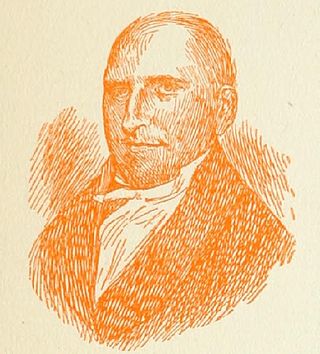Related Research Articles

The 5th United States Congress was a meeting of the legislative branch of the United States federal government, consisting of the United States Senate and the United States House of Representatives. It met at Congress Hall in Philadelphia, Pennsylvania, from March 4, 1797, to March 4, 1799, during the first two years of John Adams' presidency. In the context of the Quasi-War with France, the Alien and Sedition Acts were passed by Congress. The Acts were overwhelmingly supported by the Federalists and mostly opposed by the Democratic-Republicans. Some Democratic-Republicans, such as Timothy Bloodworth, said they would support formally going to war against France but they opposed the Alien and Sedition Acts which Bloodworth and others believed were unconstitutional.

The Territory of Mississippi was an organized incorporated territory of the United States that was created under an organic act signed into law by President John Adams on April 7, 1798, and was dissolved on December 10, 1817, when the western half of the territory was admitted to the Union as the State of Mississippi. The eastern half was redesignated as the Alabama Territory until it was admitted to the Union as the State of Alabama on December 14, 1819. The Chattahoochee River played a significant role in the definition of the territory's borders. The population rose in the early 1800s from settlement, with cotton being an important cash crop.

The United States District Court for the Western District of Tennessee is the federal district court covering the western part of the state of Tennessee. Appeals from the Western District of Tennessee are taken to the United States Court of Appeals for the Sixth Circuit.

The United States District Court for the District of New Hampshire is the federal district court whose jurisdiction comprises the state of New Hampshire. The Warren B. Rudman U.S. Courthouse for the New Hampshire district is located in Concord.

A sister republic was a republic established by French armies or by local revolutionaries and assisted by the First French Republic during the French Revolutionary Wars. These republics, though nominally independent, relied heavily on France for protection, making them more akin to autonomous territories rather than independent states. This became particularly evident after the declaration of the French Empire, when several states were annexed, and the remaining turned into monarchies ruled by members of the Bonaparte family.

The 1802–03 United States House of Representatives elections were held on various dates in various states between April 26, 1802 and December 14, 1803. Each state set its own date for its elections to the House of Representatives, either before or after the first session of the 8th United States Congress convened on October 17, 1803. They occurred during President Thomas Jefferson's first term in office.

The 1798–99 United States House of Representatives elections were held on various dates in various states between April 24, 1798 in New York and August 1, 1799 in Tennessee. Each state set its own date for its elections to the House of Representatives, with some after the official start of the 6th United States Congress on March 4, 1799, but before the start of the first session of this Congress in Philadelphia on December 2, 1799. These elections were held during President John Adams term. It was the last congressional session before the move to the new capital at Washington, D.C. Elections were held for all 106 seats, representing 16 states.
Theophilus Bradbury was a U.S. Representative from Massachusetts. He graduated from Harvard College in 1757; taught school and studied law in Portland; was admitted to the bar and commenced practice in Portland in 1761; moved to Newburyport in 1764 and continued the practice of law; member of the State senate 1791-1794; elected as a Federalist to the Fourth and Fifth Congresses and served from March 4, 1795, until July 24, 1797, when he resigned; appointed justice of the Massachusetts Supreme Judicial Court in 1797. He was elected a Fellow of the American Academy of Arts and Sciences in 1798. Bradbury was a member of the electoral college in 1800.
William Gordon was an American politician and a United States Representative from the state of New Hampshire.

Silas Lee was a lawyer, judge, and United States Representative from Massachusetts. Born in Concord in the Province of Massachusetts Bay, he pursued classical studies and graduated from Harvard University in 1784. He studied law, was admitted to the bar, and was a member of the Massachusetts House of Representatives in 1793, 1797, and 1798.
Thomas Morris was a United States representative from New York and was the son of Founding Father Robert Morris.

The United States District Court for the Eastern District of Tennessee is the federal court in the Sixth Circuit whose jurisdiction covers most of East Tennessee and a portion of Middle Tennessee. The court has jurisdiction over 41 counties with 4 divisions. Based in Knoxville, Tennessee, it maintains branch facilities in Chattanooga, Tennessee; Greeneville, Tennessee; and Winchester, Tennessee.

William Sanford Pennington was a United States Attorney for the District of New Jersey, an associate justice of the Supreme Court of New Jersey, the sixth governor of New Jersey and a United States district judge of the United States District Court for the District of New Jersey.

The 1803 United States Senate election in New York was held on February 1, 1803, by the New York State Legislature to elect a U.S. Senator to represent the State of New York in the United States Senate.

Arthur Wolfe, 1st Viscount Kilwarden was an Anglo-Irish peer, politician and judge, who held office as Lord Chief Justice of Ireland. He was assassinated during the Irish rebellion of 1803.

The 1802 United States House of Representatives elections in New York were held from April 27 to 29, 1802, to elect 17 U.S. Representatives to represent the State of New York in the United States House of Representatives of the 8th United States Congress.
United States Attorney for the District of Georgia is a defunct United States Attorney's office based in the state of Georgia until 1883. The U.S. Attorney for Georgia was the chief law enforcement officer for the United States District Court for the District of Georgia, one of the 13 original district courts. The district was succeeded by the United States Attorney for the Northern District of Georgia and the United States Attorney for the Southern District of Georgia.
References
- ↑ Executive Office for United States Attorneys (1989). Bicentennial Celebration of United States Attorneys, 1789–1989 (PDF) (Report). Washington, District of Columbia: United States Department of Justice. Retrieved 2023-06-19.